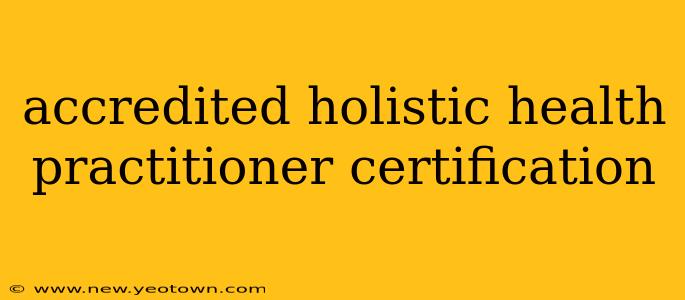The path to becoming an accredited holistic health practitioner is a journey of passion, dedication, and a deep commitment to well-being. It's not just about earning a certificate; it's about embracing a philosophy that prioritizes the interconnectedness of mind, body, and spirit. This article explores the process, addressing common questions and highlighting the crucial aspects of achieving this rewarding certification.
What is a Holistic Health Practitioner?
Before diving into certifications, let's define the role. A holistic health practitioner takes a comprehensive approach to health, treating the whole person rather than focusing solely on symptoms. They consider lifestyle factors, emotional well-being, and spiritual aspects alongside physical health to create personalized wellness plans. They often integrate various modalities like nutrition, herbalism, massage therapy, energy healing, and more.
What are the Different Types of Holistic Health Practitioner Certifications?
There's no single, universally recognized "Holistic Health Practitioner" certification. The field is diverse, with various specializations. Certifications often focus on specific modalities, such as:
- Nutritional Therapy: Certifications focused on nutritional counseling and dietary strategies for optimal health.
- Herbalism: Certifications focusing on the safe and effective use of herbs for therapeutic purposes.
- Massage Therapy: Certifications in various massage techniques, often requiring state licensure.
- Energy Healing: Certifications in techniques like Reiki, Qigong, or other energy-based practices.
The best certification path depends on your specific interests and career goals.
How Do I Choose an Accredited Holistic Health Practitioner Certification Program?
Choosing the right program is critical. Look for programs that:
- Are accredited by a reputable organization: Accreditation ensures the program meets certain quality standards. Research accrediting bodies in your area.
- Offer comprehensive curriculum: A robust curriculum covers relevant theory, practical skills, and ethical considerations.
- Have experienced and qualified instructors: Learn from professionals with established reputations and expertise.
- Provide ample hands-on training: Practical experience is vital for honing your skills and building confidence.
- Support ongoing professional development: The field is constantly evolving, so continuous learning is essential.
What are the Requirements for Holistic Health Practitioner Certification?
Requirements vary widely depending on the program and specialization. Common requirements include:
- Completion of a specified number of course hours: This often involves coursework, workshops, and practical training.
- Passing exams: These assess your understanding of the material and your ability to apply it.
- Practical experience: Many programs require supervised internships or practicums.
- Background checks and potentially other legal requirements: Depending on the jurisdiction and specific modalities, you might need background checks or other clearances.
How Long Does it Take to Become a Certified Holistic Health Practitioner?
The time commitment varies greatly depending on the program and the chosen specialization. Some programs can be completed within a year, while others might require several years of study.
What are the Job Prospects for Certified Holistic Health Practitioners?
The job market for holistic health practitioners is growing, with increasing demand for integrative and complementary healthcare services. Potential career paths include:
- Private practice: Offering consultations and treatments to individual clients.
- Corporate wellness programs: Working with businesses to promote employee health and well-being.
- Hospitals and clinics: Integrating holistic approaches into traditional healthcare settings.
- Spa and wellness centers: Providing holistic treatments in a spa or wellness environment.
Is Certification Necessary to Practice Holistic Health?
The legality of practicing holistic health without formal certification varies depending on your location and the specific modalities offered. Some areas require licensure for specific practices (like massage therapy or acupuncture), while others have less stringent regulations. However, certification significantly enhances credibility and professional standing.
This journey to becoming an accredited holistic health practitioner is both challenging and deeply rewarding. By carefully researching programs and committing to continuous learning, you can pave the way for a successful and fulfilling career dedicated to promoting holistic well-being. Remember to always prioritize ethical practices and client safety throughout your journey.

